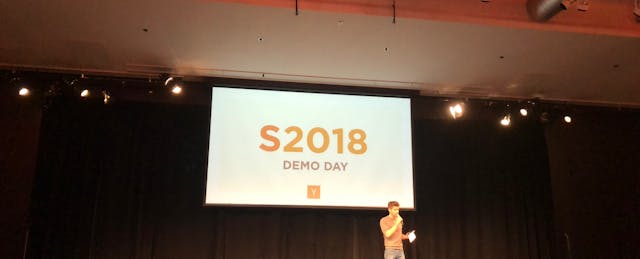Investors and founders packed into the Computer History Museum in Mountain View, Calif. for startup accelerator Y Combinator’s Summer 2018 Demo Day. For those counting, this was the 27th version of the event, which always features a motley of startups and services: There’s Kobo360, an “Uber for trucking in Africa,” and Cambridge Glycoscience, which wants to bring the concept of “cake zero”—sweets with sugar substitutes—to the masses.
Seven of the 134 companies in this batch provide education services—which is a similar percentage from the last cohort. Since the previous Demo Day in March, Tim Brady, a partner at Y Combinator who advises edtech startups, says he hasn’t noticed much in terms of changes in the education landscape. Education moves relatively slow, he says, and trends don’t tend to shift in six months.
In this latest cohort of edtech companies, only one is aimed at being used in classrooms. Why not more? Brady says selling to schools, and adoption, is tough. “I think the other factor is, things like productivity tools for teachers, there’s been a lot of offerings in the last eight years,” he says.
Here’s what that one classroom-facing company is offering, and what the other six edtech startups hope to accomplish off the school campus.
askMyClass
This Menlo Park-based startup seeks to offer teachers classroom management strategies, lesson support and social-emotional support for students via voice technology. The company says the tool is best used with a voice assistant device like Amazon Alexa, but teachers can access it on tablets and phones as well. The startup focuses on educators in pre-K to 5th-grade classrooms.
The husband-and-wife duo behind the company, Aparna and Deepak Ramanathan, come from different backgrounds. Aparna is a doctor, and Deepak previously worked at Google. But what brought them together was wanting to give teachers an “extra pair of hands”—for instance, a teacher can ask the assistant to give the class a math problem so that she can momentarily divert her attention to one student.
“A lot of what we’ve been thinking about is how this tool can save time for teachers, but also enhance the environment for learning in the classroom,” says Deepak, explaining that there are many moments where teachers need to be in multiple places at once.
The company claims that in the five weeks since it’s launched, it’s been adopted 436 classrooms. Deepak says most of askMyClass’s popular activities are free to use. There’s also a membership option that costs $40 per year. That’ll give teachers access to a community of peers who also use voice in the classroom, and the ability to customize content.
Goodly
Some companies offer to help employees pay off their student loans, and Goodly offers a platform to help these organizations offer student loan repayment as an employee benefit.
Companies that use Goodly only pay for those employees that decide to take advantage of a student loan repayment matching program. Plans will run companies $6 per month for each participating employee.
Cofounder and CTO Hemant Verma says Goodly considers Tuition.io and Gradifi, which was acquired by First Republic Bank, as its main competitors. Cofounder and CEO Gregory Poulin adds that what Goodly offers that those two companies don’t is a streamlined setup process, and integration with payroll providers.
The San Francisco-based company was founded in April 2018, and launched two weeks ago. It currently has ten paying customers, mostly startups. So far, Y Combinator has been Goodly’s only source of funding.
CSPA
CSPA stands for “Computer Science Proficiency Assessment.” Cofounder James Lin likens it to an “SAT for software engineers.”
The test costs $19 to take, and CSPA can waive the fee for those with financial difficulties. The five-hour long test comes with about 100 questions. There are multiple-choice questions, coding exercises and two essay questions. Lin notes that the format isn’t completely finalized. Students take the test on their own laptops and are free to use the internet as they see fit, as CSPA is s an open-book test. The San Francisco-based company ran its first pilot in July with 76 test takers.
In terms of whether CSPA’s revenue model would only come from students paying to take the test, or also through companies paying to access their scores, Lin says it’s still too early to tell. “There is more money in the employer side, around recruiting. There’s also money in the education side.” CSPA cofounder Angel Poon thinks there’s an opportunity for the company to partner with educational organizations to give students who’ve taken the test recommendations on places they could go to improve their skills.
Lin points out that while medicine, law and finance professions require certifications, software engineering doesn’t—but it should. His hope is that CSPA can become an authority to certifying this skill.
The two co-founders met previously when they worked at Crunchyroll, a streaming company for East Asian media that Lin helped start, and where Poon was a product manager.
AnnieCannons
The only nonprofit of this round’s edtech graduates, AnnieCannons turns human trafficking survivors into software engineers.
The Oakland-based organization is partially funded through a software development consultancy it runs. It takes student referrals from safe houses and service providers. Survivors go through a free, in-person six-month training session, and from there, are able to work as contractors at AnnieCannons’ software consultancy arm. Cofounder and executive director Laura Hackney says after two or three years of contracting, some students can build the skills and portfolios needed to apply for jobs at tech companies.
To date, 37 students have started the program. They don’t get a certificate—cofounder and CEO Jessica Hubley says AnnieCannons measures its success by how much money the students make.
The nonprofit began in in 2015, and this year, between 8 to 10 percent of its funding came via commissions from its consultancy business. Hubley is open to venture capital money. “We do make money, we do have a revenue model,” she explains.

Kunduz
Based in Istanbul, Turkey, Kunduz is a test-prep app that provides instant answers to students’ questions. Currently, the app focuses on materials for Turkey’s university-entrance exam, but plans on expanding to India.
According to cofounder Başar Başaran, the platform uses human tutors who are paid per question, and can earn from anywhere from 10 to 15 cents per question. However, he points out that Kunduz also uses image recognition technology to help answer questions in seconds, without the need to ask a human tutor. “As we solve more questions everyday, we need fewer tutors.” Başaran adds that unlike “more conventional adaptive testing products,” which ask users a series of questions to understand what they can and cannot solve, Kunduz “can start recommending them very similar questions right after they ask” a question.
In the past 18 months, Kunduz claims it has had about 6,000 paying monthly subscribers, who pay an average subscription fee of $17 per month. Packages start from $5 and go up to $40. “Each has different number of question limits to ask along with some extra benefits.”
Aside from Y Combinator’s support, the company has raised about $400,000 in funding from a private school founder in Turkey, some angel investors and two venture capitalists.
Ubits
Ubits focuses on corporate learning in the Latin American market. CEO and cofounder Julián Melo describes it as a Netflix for online corporate training courses.
Companies pay $50 per user per year to give employees access to training materials in areas such as sales, marketing and leadership. The courses are called “bits.” Melo says Ubits uses machine learning to recommend courses based on students’ behavior and what it knows about their role at a company. “For example, we recommend based on what your peers have seen in the same industry, but in other companies,” he says. “Or sometimes we ask managers to create a playlist of content and then they can share them to their employees.”
Ubits is headquartered in Bogota, Colombia, and also has employees in Mexico. Melo says the company already has more than 70 customers, including multinational companies like Citi and BNP Paribas. Melo says the average corporate customer brings in $9000 for Ubits.
The company was bootstrapped up until about two months ago, says Melo. Since then, it’s raised $500,000 from venture capitalists in Mexico, Colombia and Brazil, and angel investors in San Francisco.
ExceptionALLY
Pronounced as two words (“exception - ally”), the Atlanta-based startup offers what it dubs a “TurboTax for special education.” What that means: a web-based tool that aims to empower parents with information to secure additional school supports for children with special learning needs.
For students with special needs, districts typically offer Individualized Lesson Plans (IEP) or 504 Plans that outline extra supports, accommodations and goals. But the process to get them can be opaque, lengthy and even sometimes confrontational, says Rayford Davis, the company’s co-founder and CEO. Parents are required to go through interviews and produce documentation about their children’s needs, and he observed firsthand how difficult it was to get her niece to get appropriate special-ed support services from her school.
On ExceptionALLY, parents can see the process involved in getting an IEP, and the tool walks them through a series of questions about their observations and experiences with their children. This information is then used to create a report that parents can share with school officials. The platform also offers tips on how to present the materials to school officials and make the best case for getting on a plan. “We’re making sure that when parents go into the meeting, they’re better equipped to better engage with the district’s student support team,” he says.
Subscriptions cost $20 per month or $200 per year, and parents of children on free or reduced lunch get a 50 percent discount. The company has raised some money from angel investors, but did not disclose financial details or how many people are currently using its product.


